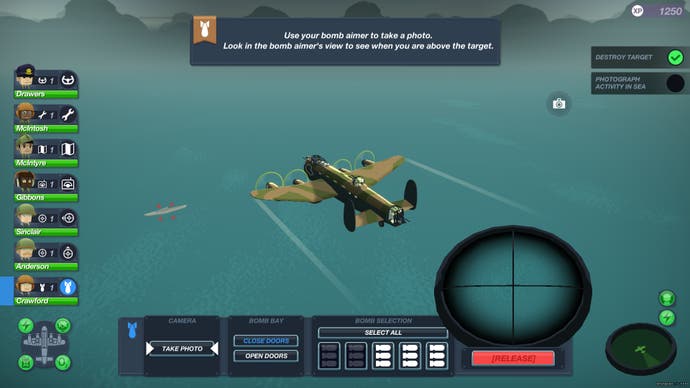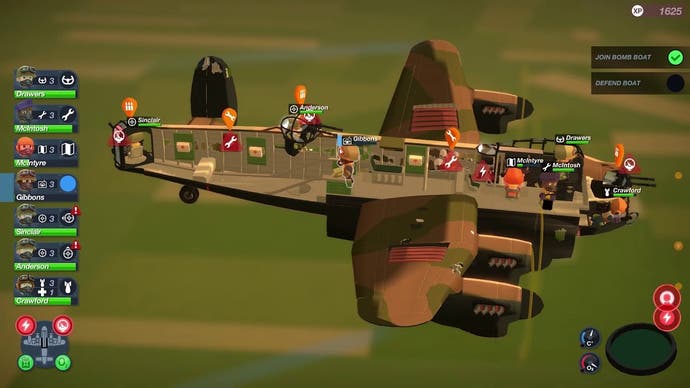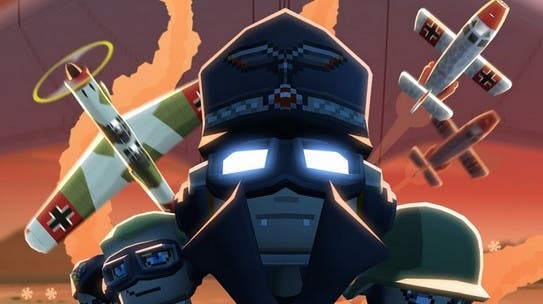Bomber Crew review - a chaotic strategy game that can be both compelling and confusing
Up in the air.
By the time I reach the seventh and final critical mission of Bomber Crew, I know this is a one way trip.
Despite the game's cute, cartoony aesthetics, it's a game about war. Every mission has a main objective - most involve destroying military targets like factories, ammo dumps, and submarines - and bonus objectives. Returning to base is always one of the latter. You can, and will, lose planes and people.
Broadly, Bomber Crew tasks you with controlling seven air force members in order to carry out missions against Nazi forces in Europe. (The game never explicitly uses the word Nazi, but enemy pilots speak with exaggerated German affectations; their planes sport Iron Crosses; missions clearly pull from D-Day and Operation Chastise.) Each member of the crew has their own role: navigation, taking down enemy fighter jets, operating the radio, and so forth. There's always someone to instruct, or a heading or enemy to tag. It can quickly become chaos.

Sometimes, this chaos is exhilarating. Defending ally pilots stranded in the Channel from waves of enemy fighters was a particular joy, especially when ace pilots were thrown into the mix. These named characters recur until you defeat them, and can be extremely dangerous, but equally satisfying to overcome. After these intense missions, coasting back over the British countryside under a pastel pink sky feels serene and earned.
During these great moments, it's the sound design that really shines. Enemy ace pilots each have their own soundtrack that helps them stand out from one another, and makes the missions when they're present that much more tense. Other noises help to contextualise the chaos: a strange rattling might indicate that the oxygen system is in need of repair, or a crackling fire will demand immediate attention. Then, having all of that fade into silence but for the chirping birds and wartime radio tunes as you contemplate upgrades back at base helps to reset the mood until you're ready for another mission.
But too often the flights are chaotic in all the wrong ways. Crucially, they spiral into disaster for reasons I couldn't understand. The clearest example of this is that it took several nose-dives into the ground to realise that I was sometimes ordering my pilot to leave the controls because they sit directly behind the engineer, and it was extremely easy to misclick. The developers have now added the ability to lock the pilot in place - as is the case with the console versions - but I didn't discover it for a long time as it was never tutorialised. And it wasn't the only thing I had to work out for myself, nor did I solve every mystery of why my plane suddenly fell from the sky.
I first started playing on Switch, but menuing, selecting characters, and giving instructions was much more difficult with buttons than with a mouse. Even after moving to PC, it took three or four hours to feel as though I was getting a handle on the minute to minute flying.
By that point, Bomber Crew had trained me out of caring about my crew. At first, I had diligently kept track of my recruits. Though they are completely customisable, each one is assigned a little information - a simple gesture that lends a real sense of a diverse group of ordinary people pitching in. For example, Bridget MacKay, my first engineer, had just slightly more survivability if the plane went down in some remote part of Europe because she had previously been a hiker. Two of my other beginner recruits were both greengrocers and I was able to spin a tale to myself about how they had known each other before the war, and had signed up together.
But early on, my squads had such a high turnover rate that I stopped even recognising them. Over and over, my plane would go down, some crew members dying instantly, others losing or winning a dice roll that balanced their survival gear against the likelihood of going missing in action. The main menu has the option of viewing a memorial wall, which would have been touching were it not full of completely unfamiliar names.
Instead, I got attached to my planes. Even though they could be destroyed, a new plane would be provided with similar levels of upgrades. (Though not exactly the same - I also never fully understood what carried over and why.) I painted each new bomber a different colour to distinguish it from its destroyed peers, dabbling occasionally in the many options for art on the nose, wings, and fuselage.
Grinding to make my planes better did become satisfying, especially once I finally managed to last more than a few missions at a time without a total disaster. But I remained unattached to the crew. After many hours, I got an achievement for someone flying thirty successful missions, but I wasn't sure who it was. Two missions later, I completed the fifth critical quest, and lost my plane and everyone on board in the process. It didn't mean much to me.

And so I came to the final critical mission. As I expected, we went down over Berlin. Almost every member of the crew was either already dead or killed in the crash. But a single spinning wheel appeared: my pilot, Margaret Marshall, had a 9 to 100 chance of making it home.
She survived.
At the end of the game, there's a parade, with confetti raining down. Margaret stood, head bowed, opposite a clutch of cheering NPCs. She looked distraught: the war was over, but at what cost?
I felt like this was the story I had been hoping for, and yet I was mostly still confused. I didn't know exactly what had caused the crash, or why only Margaret had been given the dice roll to survive. I knew what gear I had given her to have that small chance of making it, but not exactly why it had been so likely that she wouldn't.
In short, it felt like a microcosm of the game's missed opportunities. Once you figure out its mechanics, Bomber Crew can be a compelling cycle of intense missions and calmer, methodical decisions about upgrades. But its steep initial learning curve undermines the potential for emergent storytelling. Had I understood more of the game, and done so earlier; had it capitalised on my willingness to become attached rather than encouraging me to treat my crew as expendable, my experience might have been full of Margarets. As it is, she's the only one I'll really remember.


